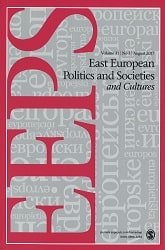Internal Exclusion, External Inclusion: Diaspora Politics and Party-Building Strategies in Post-Communist Hungary
Internal Exclusion, External Inclusion: Diaspora Politics and Party-Building Strategies in Post-Communist Hungary
Author(s): Myra A. WaterburySubject(s): Civil Society, Political history, Government/Political systems, International relations/trade, Nationalism Studies, Transformation Period (1990 - 2010), Post-Communist Transformation, Sociology of Politics, Identity of Collectives, Asylum, Refugees, Migration as Policy-fields
Published by: SAGE Publications Ltd
Keywords: Hungary; diaspora; party politics; FIDESZ; nationalism;
Summary/Abstract: This article examines the domestic politics behind Hungary’s controversial 2001 “Status Law,” which granted special cultural and economic benefits to ethnic Hungarians who are citizens of other states. It argues that Hungary’s increasingly interventionist policy toward ethnic Hungarians beyond its borders in the late 1990s was driven not by a growing sense of ethnic nationalism in society or as a reaction to the plight of ethnic kin but by the party-building strategy of right-wing elites. These elites utilized and coopted transnational ties with the diaspora to further their own political goals. Specifically, engagement with the diaspora issue provided the thengoverning Federation of Young Democrats (FIDESZ) government with symbolically charged ideological content, important organizational resources, and the basis of a longer-term strategy for governance and institutional embeddedness.
Journal: East European Politics and Societies
- Issue Year: 20/2006
- Issue No: 03
- Page Range: 483-515
- Page Count: 33
- Language: English
- Content File-PDF

